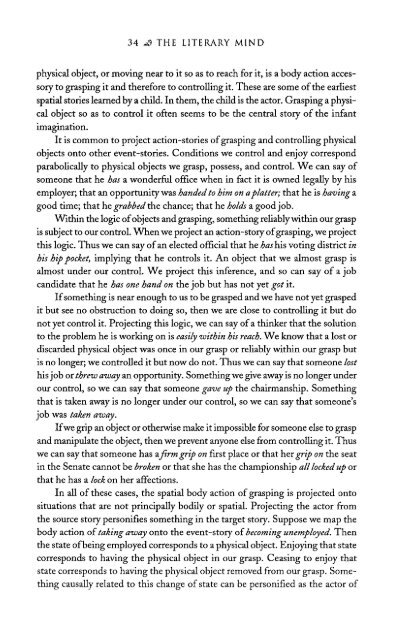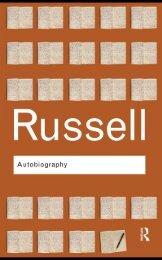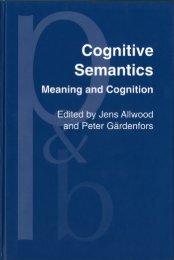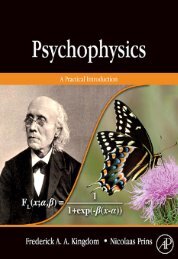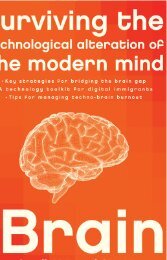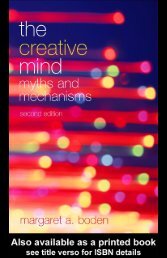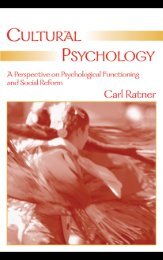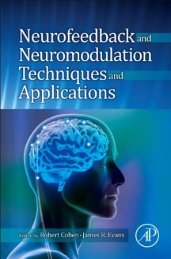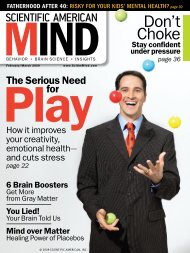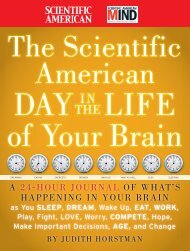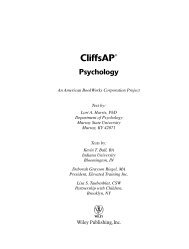The Literary Mind.pdf
The Literary Mind.pdf
The Literary Mind.pdf
Create successful ePaper yourself
Turn your PDF publications into a flip-book with our unique Google optimized e-Paper software.
34 THE LITERARY MIND<br />
physical object, or moving near to it so as to reach for it, is a body action accessory<br />
to grasping it and therefore to controlling it. <strong>The</strong>se are some of the earliest<br />
spatial stories learned by a child. In them, the child is the actor. Grasping a physical<br />
object so as to control it often seems to be the central story of the infant<br />
imagination.<br />
It is common to project action-stories of grasping and controlling physical<br />
objects onto other event-stories. Conditions we control and enjoy correspond<br />
parabolically to physical objects we grasp, possess, and control. We can say of<br />
someone that he has a wonderful office when in fact it is owned legally by his<br />
employer; that an opportunity was handed to him on a platter; that he is having a<br />
good time; that he grabbed the chance; that he holds a good job.<br />
Within the logic of objects and grasping, something reliably within our grasp<br />
is subject to our control. When we project an action-story of grasping, we project<br />
this logic. Thus we can say of an elected official that he to his voting district in<br />
his hip pocket, implying that he controls it. An object that we almost grasp is<br />
almost under our control. We project this inference, and so can say of a job<br />
candidate that he has one hand on the job but has not yet got it.<br />
If something is near enough to us to be grasped and we have not yet grasped<br />
it but see no obstruction to doing so, then we are close to controlling it but do<br />
not yet control it. Projecting this logic, we can say of a thinker that the solution<br />
to the problem he is working on is easily within his reach. We know that a lost or<br />
discarded physical object was once in our grasp or reliably within our grasp but<br />
is no longer; we controlled it but now do not. Thus we can say that someone lost<br />
his job or threw away an opportunity. Something we give away is no longer under<br />
our control, so we can say that someone gave up the chairmanship. Something<br />
that is taken away is no longer under our control, so we can say that someone's<br />
job was taken away.<br />
If we grip an object or otherwise make it impossible for someone else to grasp<br />
and manipulate the object, then we prevent anyone else from controlling it. Thus<br />
we can say that someone has a firm grip on first place or that her grip on the seat<br />
in the Senate cannot be broken or that she has the championship all locked up or<br />
that he has a lock on her affections.<br />
In all of these cases, the spatial body action of grasping is projected onto<br />
situations that are not principally bodily or spatial. Projecting the actor from<br />
the source story personifies something in the target story. Suppose we map the<br />
body action of faking away onto the event-story of becoming unemployed. <strong>The</strong>n<br />
the state of being employed corresponds to a physical object. Enjoying that state<br />
corresponds to having the physical object in our grasp. Ceasing to enjoy that<br />
state corresponds to having the physical object removed from our grasp. Something<br />
causally related to this change of state can be personified as the actor of


